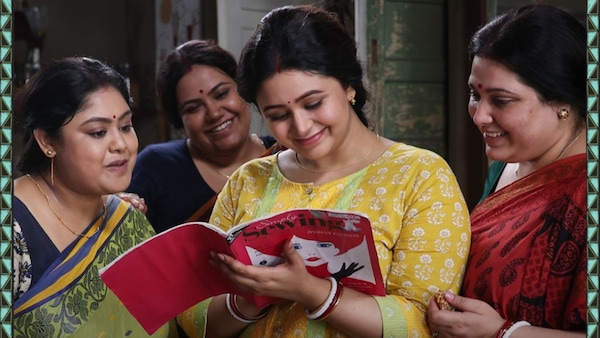Fatafati review: Ritabhari and Abir’s drama is a mindless wokeism garnished with a regressive take on a social concern

Last Updated: 12.29 AM, May 13, 2023
Story: Fullora Bhaduri (Ritabhari Chakraborty), her husband Bachoshpoti Bhaduri (Abir Chatterjee), his brother (Raktim) and their mother (Soma Banerjee) live in a small town. Fullora wants to be a successful fashion designer but her weight seems to be one of the main challenges in her life.
Review: Our society’s constant comments on one’s body type, the colour of skin, length of hair, and even physical appearance, are some of the crudest forms of patriarchy we deal with every day. While women are the worst victims of this unwarranted commentary, men and children also bear the brunt.
Fatafati promotes itself as a film with a social message that deals with body shaming. And then the social message gets lost in regressive sensitivity. It is occasionally amusing but at times, dated in its outlook. It seems that a modern-age drama gets trapped in the ’80s sensibilities because of its archaic expressions and reactions.
The biggest weakness of the film is that it tries to show the various domestic problems, social harassment, and even domestic violence against women of larger body sizes, but the solutions are presented randomly and without credibility.
In fact, the film is not a typical drawing-room drama. It is shot well in a picturesque Bengal town. However, a big-canvas film is not just about a bunch of outdoor locations. In Fatafati, the characters and their crisis are nothing more than the regular petty kitchen politics that television serials offer every evening. The verbal exchanges are not realistic and at times, pretty crass. Neither the doctor’s reaction to Fullora’s weight nor the auto driver’s taunts seem believable. In the beginning, Fullora’s mother-in-law talks in a language and tone that is spoken only in television serials.
Such is the one-dimensional understanding of the script that nearly all bad people in the film are thin and almost all good-hearted, genuine, and warm people are on the overweight side. And the bad girl, Biki Sen (Swastika Dutta), is so bad that she is a liar, insensitive, snooty, has a twisted worldview, and flirts with other’s husbands – all in one. The script doesn’t bat an eyelid to slut-shame her in a film that is made to counter body shaming. Meanwhile, in her journey as Miss Fatafati, there is no direction to what actually happens to Fullora’s real dream: to become a successful fashion designer.
In the acting department, Ritabhari delivers a convincing Fullora, despite the gaping holes in the character. It is not a trivial matter to go through a complete physical transformation just to portray a character. Ritabhari’s courage to put on weight to portray Fullora is commendable. Also, it is not just about her physical appearance, her performance as the character also deserves applause. Soma is also poised and convincing as her mother-in-law. Their interactions are engaging in the later half of the film. On the contrary, due to the lopsided characterisation of Biki Sen, Swastika appears loud and lousy. With every possible rascality that was imbibed in her character, she is way over the top. Raktim is also a little on the louder side but this smarty pant wins hearts with his cuteness. Abir Chatterjee is calm and poised and fits perfectly well as Bachashpoti. However, he appears to be a guest actor with practically little to do.
Among the other actors, Arijita Mukhopadhyay as Rinkudi shines throughout. Loknath Dey plays a small character but every time he comes on the screen he leaves a mark. Deboshree Ganguly and Sanghasri Sinha are adequately good at their job.
As mentioned earlier, the film is nicely shot. Along with the beautiful shots around Dhulishohor – the town portrayed in the film, songs are the forte of Fatafati. From Jani Okaron to Swapno Bonar Somoye Ekhon and Fullora – the songs are soothing and entertaining throughout. Also, some dialogues are strikingly funny. Fullora’s MIL catches her while she practices her dialogues in the kitchen. Their exchange leaves you in splits.
Verdict: Fatafati is not the first film on body shaming. Ayushmann Khurrana and Bhumi Pednekar’s 2015 drama Dum Laga Ke Haisha is one example that is on a similar crisis but deals with great care. As a result, it seems identifiable, engaging, and entertaining. On the other hand, the Fatafati makers have little understanding of the real problem of our society’s body shaming it seems. As a result, the film turns out to be a half-baked wokism and a regressive take on a real social concern.
Subscribe to our newsletter for top content, delivered fast.

